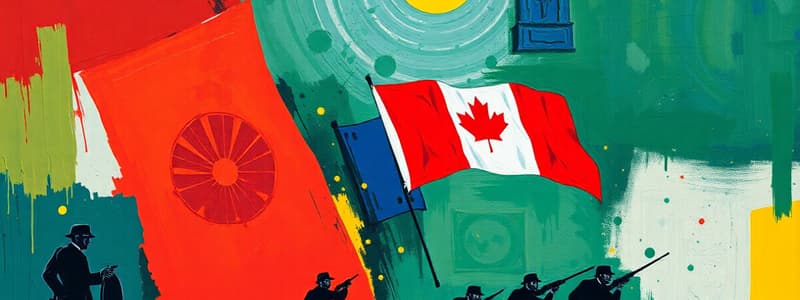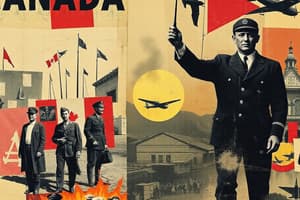Podcast
Questions and Answers
Which of these options are correct? (Select all that apply)
Which of these options are correct? (Select all that apply)
- Russia (correct)
- Italy (correct)
- France (correct)
- Germany (correct)
- Austria-Hungary (correct)
- Britain (correct)
What was the main cause of World War I?
What was the main cause of World War I?
Assassination of Archduke Ferdinand and his wife Sophia in Sarajevo by Gavrilo Princip, a member of the Serbian terrorist group Black Hand
The first prime minister of Canada was John A. Macdonald.
The first prime minister of Canada was John A. Macdonald.
True (A)
The Battle of the Somme took place in Belgium.
The Battle of the Somme took place in Belgium.
The Battle of Vimy Ridge victory was a significant step toward Canadian independence.
The Battle of Vimy Ridge victory was a significant step toward Canadian independence.
The Battle of Passchendaele was a decisive victory for Canadian soldiers.
The Battle of Passchendaele was a decisive victory for Canadian soldiers.
What country was the primary instigator of the U-Boat attacks during World War I?
What country was the primary instigator of the U-Boat attacks during World War I?
What was the main reason for the Halifax explosion?
What was the main reason for the Halifax explosion?
The Treaty of Versailles, signed after World War I, was viewed as fair and reasonable by Germany.
The Treaty of Versailles, signed after World War I, was viewed as fair and reasonable by Germany.
What does the term 'Propaganda' refer to?
What does the term 'Propaganda' refer to?
Conscription was supported by both English and French Canadians during World War I.
Conscription was supported by both English and French Canadians during World War I.
What was the main factor that led to the rise of the Bolsheviks in Russia?
What was the main factor that led to the rise of the Bolsheviks in Russia?
What was the main contributing factor to the economic problems Canada faced after World War I?
What was the main contributing factor to the economic problems Canada faced after World War I?
What was the main impact of the Winnipeg General Strike of 1919?
What was the main impact of the Winnipeg General Strike of 1919?
The National Progressive Party, founded by Thomas Crerar, was a major political force in Canada during the 1920s.
The National Progressive Party, founded by Thomas Crerar, was a major political force in Canada during the 1920s.
The King-Byng Crisis led to the Statute of Westminster.
The King-Byng Crisis led to the Statute of Westminster.
The Person's Case, brought by the Famous Five, successfully granted women the right to vote across Canada.
The Person's Case, brought by the Famous Five, successfully granted women the right to vote across Canada.
The economic boom of the 1920s was a result of reduced consumption and increased savings.
The economic boom of the 1920s was a result of reduced consumption and increased savings.
The Great Depression was caused primarily by overproduction and a decline in consumer demand.
The Great Depression was caused primarily by overproduction and a decline in consumer demand.
What term refers to the intense dislike of foreigners?
What term refers to the intense dislike of foreigners?
What was the main reason R.B. Bennett's popularity declined during the Great Depression?
What was the main reason R.B. Bennett's popularity declined during the Great Depression?
The Canadian Relief Camps, established during the Great Depression, were well-resourced and provided effective assistance to the unemployed.
The Canadian Relief Camps, established during the Great Depression, were well-resourced and provided effective assistance to the unemployed.
The 'On to Ottawa Trek' was a peaceful demonstration aimed at improving the lives of the unemployed.
The 'On to Ottawa Trek' was a peaceful demonstration aimed at improving the lives of the unemployed.
What Canadian political party was founded during the Great Depression to advocate for greater social justice and equality?
What Canadian political party was founded during the Great Depression to advocate for greater social justice and equality?
The Social Credit movement, led by William Aberhart, successfully implemented its policy of providing cash payments to all Albertans.
The Social Credit movement, led by William Aberhart, successfully implemented its policy of providing cash payments to all Albertans.
What was the main goal of the Union Nationale party in Quebec?
What was the main goal of the Union Nationale party in Quebec?
The Padlock Law, enacted in Quebec, targeted Jewish people, labor organizers, and communists.
The Padlock Law, enacted in Quebec, targeted Jewish people, labor organizers, and communists.
What major event in the 1930s helped to promote the development of Canadian broadcasting?
What major event in the 1930s helped to promote the development of Canadian broadcasting?
World War II was primarily caused by the economic hardship and social unrest that followed the Great Depression.
World War II was primarily caused by the economic hardship and social unrest that followed the Great Depression.
What term describes the political ideology associated with Adolf Hitler and the Nazi Party?
What term describes the political ideology associated with Adolf Hitler and the Nazi Party?
Hitler came to power in Germany through a peaceful and democratic election.
Hitler came to power in Germany through a peaceful and democratic election.
The 'Kristallnacht' was a symbol of peaceful protest against the Jewish community in Germany.
The 'Kristallnacht' was a symbol of peaceful protest against the Jewish community in Germany.
What major event in 1939 effectively marked the beginning of World War II?
What major event in 1939 effectively marked the beginning of World War II?
The Allied Powers in World War II consisted of Britain, France, the Soviet Union, and Japan.
The Allied Powers in World War II consisted of Britain, France, the Soviet Union, and Japan.
The 'Blitz' was a strategic air campaign solely carried out by the British Royal Air Force against Germany.
The 'Blitz' was a strategic air campaign solely carried out by the British Royal Air Force against Germany.
The Dieppe Raid, a major Canadian operation in World War II, was a decisive victory for the Allied forces.
The Dieppe Raid, a major Canadian operation in World War II, was a decisive victory for the Allied forces.
Ortona, a strategic battle in World War II, was fought solely by Canadian troops.
Ortona, a strategic battle in World War II, was fought solely by Canadian troops.
D-Day, the Allied invasion of Normandy, marked the end of World War II.
D-Day, the Allied invasion of Normandy, marked the end of World War II.
After World War II, Japan's economic and military power rapidly declined.
After World War II, Japan's economic and military power rapidly declined.
What term refers to a conflict in which two opposing powers fight indirectly through proxy forces?
What term refers to a conflict in which two opposing powers fight indirectly through proxy forces?
What major event in the 1950s brought Canada and the United States together in defending against potential Soviet aggression?
What major event in the 1950s brought Canada and the United States together in defending against potential Soviet aggression?
The Suez Canal Crisis was primarily a conflict between Egypt and the United States, with Great Britain and France playing a minor role.
The Suez Canal Crisis was primarily a conflict between Egypt and the United States, with Great Britain and France playing a minor role.
The Cuban Missile Crisis was the most serious nuclear crisis in history.
The Cuban Missile Crisis was the most serious nuclear crisis in history.
Canada officially became a fully independent nation with the passage of the Canadian Constitution Act in 1982.
Canada officially became a fully independent nation with the passage of the Canadian Constitution Act in 1982.
The Meech Lake Accord was successful in resolving the constitutional issues that had been at the heart of Quebec's relationship with the rest of Canada.
The Meech Lake Accord was successful in resolving the constitutional issues that had been at the heart of Quebec's relationship with the rest of Canada.
The Charlottetown Accord, an attempt at constitutional reform, was approved by a majority of Canadians in 1992.
The Charlottetown Accord, an attempt at constitutional reform, was approved by a majority of Canadians in 1992.
What major event in 1970 led to the deployment of Canadian troops and the imposition of the War Measures Act in Quebec?
What major event in 1970 led to the deployment of Canadian troops and the imposition of the War Measures Act in Quebec?
The Quebec sovereignty movement ultimately succeeded in securing Quebec's independence from Canada in 1995.
The Quebec sovereignty movement ultimately succeeded in securing Quebec's independence from Canada in 1995.
The creation of the Canadian Radio-Television and Telecommunications Commission (CRTC) was aimed at restricting the flow of American entertainment programs into Canada.
The creation of the Canadian Radio-Television and Telecommunications Commission (CRTC) was aimed at restricting the flow of American entertainment programs into Canada.
Brian Mulroney's introduction of the Goods and Services Tax (GST) in 1991 was a popular policy that helped to bolster the Conservative Party's popularity.
Brian Mulroney's introduction of the Goods and Services Tax (GST) in 1991 was a popular policy that helped to bolster the Conservative Party's popularity.
The Reform Party, founded by Preston Manning in 1987, later merged with the Progressive Conservative Party to form the Conservative Party of Canada under the leadership of Stephen Harper.
The Reform Party, founded by Preston Manning in 1987, later merged with the Progressive Conservative Party to form the Conservative Party of Canada under the leadership of Stephen Harper.
Flashcards
Confederation of Canada (1867)
Confederation of Canada (1867)
Canada was confederated on July 1st, 1867, with four provinces: Ontario, Quebec, New Brunswick, and Nova Scotia. It was initially inhabited mostly by British people, with French Canadians in Quebec and Indigenous people under the authority of the government.
John A. Macdonald and Early Canadian Identity
John A. Macdonald and Early Canadian Identity
The first prime minister of Canada, John A. Macdonald, focused on attracting British immigrants and maintaining a strong connection with Britain.
Laurier's Western Expansion
Laurier's Western Expansion
Wilfrid Laurier, a French Canadian, became Prime Minister in 1896 and promoted westward expansion through immigration. Clifford Sifton, the Minister of the Interior, led this campaign, encouraging immigrants from all backgrounds to settle in the prairies.
Canadian Involvement in the Boer War
Canadian Involvement in the Boer War
Signup and view all the flashcards
Nationalism
Nationalism
Signup and view all the flashcards
Imperialism
Imperialism
Signup and view all the flashcards
Militarism
Militarism
Signup and view all the flashcards
Alliance System
Alliance System
Signup and view all the flashcards
Assassination of Archduke Franz Ferdinand (WW1 Trigger)
Assassination of Archduke Franz Ferdinand (WW1 Trigger)
Signup and view all the flashcards
Triple Entente and Triple Alliance (WW1)
Triple Entente and Triple Alliance (WW1)
Signup and view all the flashcards
Canada's Entry into World War I
Canada's Entry into World War I
Signup and view all the flashcards
Trench Warfare
Trench Warfare
Signup and view all the flashcards
Conditions in Trenches (WW1)
Conditions in Trenches (WW1)
Signup and view all the flashcards
Major Battles with Canadian Involvement (WW1)
Major Battles with Canadian Involvement (WW1)
Signup and view all the flashcards
Second Battle of Ypres (WW1)
Second Battle of Ypres (WW1)
Signup and view all the flashcards
Battle of the Somme (WW1)
Battle of the Somme (WW1)
Signup and view all the flashcards
Battle of Vimy Ridge (WW1)
Battle of Vimy Ridge (WW1)
Signup and view all the flashcards
Battle of Passchendaele (WW1)
Battle of Passchendaele (WW1)
Signup and view all the flashcards
The Red Baron (Manfred von Richthofen)
The Red Baron (Manfred von Richthofen)
Signup and view all the flashcards
Billy Bishop and Roy Brown (Canadian Aces)
Billy Bishop and Roy Brown (Canadian Aces)
Signup and view all the flashcards
Canada's Role in World War I: Overall Impact
Canada's Role in World War I: Overall Impact
Signup and view all the flashcards
Unrestricted Submarine Warfare (WW1)
Unrestricted Submarine Warfare (WW1)
Signup and view all the flashcards
Convoy System (WW1)
Convoy System (WW1)
Signup and view all the flashcards
Sinking of the Lusitania (WW1)
Sinking of the Lusitania (WW1)
Signup and view all the flashcards
Total War
Total War
Signup and view all the flashcards
Victory Gardens
Victory Gardens
Signup and view all the flashcards
Rationing
Rationing
Signup and view all the flashcards
Propaganda
Propaganda
Signup and view all the flashcards
Conscription
Conscription
Signup and view all the flashcards
French Canadian Opposition to Conscription
French Canadian Opposition to Conscription
Signup and view all the flashcards
Laurier's Opposition to Conscription
Laurier's Opposition to Conscription
Signup and view all the flashcards
Henri Bourassa and Anti-Conscription Protests
Henri Bourassa and Anti-Conscription Protests
Signup and view all the flashcards
Military Service Bill (1917)
Military Service Bill (1917)
Signup and view all the flashcards
Military Voters Act (1917)
Military Voters Act (1917)
Signup and view all the flashcards
Wartime Election Act (1917)
Wartime Election Act (1917)
Signup and view all the flashcards
Union Government (WW1, Canada)
Union Government (WW1, Canada)
Signup and view all the flashcards
Study Notes
Formation of Canada (1867-1914)
- Canada was confederated on July 1st, 1867, consisting of Ontario, Quebec, New Brunswick, and Nova Scotia
- John A. Macdonald was the first prime minister
- The initial majority of inhabitants were British, with French settlers in Quebec and Indigenous peoples under government authority
World War 1
- Nationalism, militarism, imperialism, and alliances led to WWI
- Nationalism: loyalty to one's people and homeland
- Militarism: the belief that strength equates safety
- Imperialism: the desire to expand an empire
- Triple Entente (Russia, Britain, France) and Triple Alliance (Germany, Italy, Austria-Hungary) were the main alliances
- The assassination of Archduke Ferdinand triggered the war
- Gavrilo Princip, a member of the Black Hand, assassinated the Archduke
- Canada was obligated to participate in WWI due to Britain's control over Canadian foreign policy
Trench Warfare
- Deep trenches, used as a defensive strategy to slow advancements, were the primary method of conflict
- "No Man's Land" was the dangerous zone between opposing trenches. It was filled with obstacles like barbed wire, mines, enemy fire, and bodies.
- Conditions were harsh, including exposure to cold, wet, and muddy conditions, as well as infestations with vermin.
Canadian Participation in WWI
- Canada sent the Canadian Expeditionary Force (CEF) of 25,000 men.
- Sam Hughes, the Minister of Militia, oversaw the recruitment program.
- Four major battles - Ypres, Somme, Passchendaele, and Vimy Ridge saw Canadian involvement
- Vimy Ridge in 1917 was a significant victory, and the first time that four Canadian Divisions fought together
- Creeping barrage tactics used to advance towards enemy lines, and led to a German retreat.
- 10,602 Canadian casualties at Vimy Ridge.
Other Key WWI events
- The 2nd Battle of Ypres (1915): First use of poison gas by Germany,
- Battle of the Somme (1916): A long, costly battle.
- Battle of Passchendaele (1917): Significant number of Canadian casualties due to the waterlogged and muddy terrain.
Studying That Suits You
Use AI to generate personalized quizzes and flashcards to suit your learning preferences.
Related Documents
Description
This quiz explores the critical events from the formation of Canada in 1867 to the impact of World War I. It covers key elements like Canadian confederation, nationalism, and trench warfare. Assess your understanding of these historical milestones and their significance.




